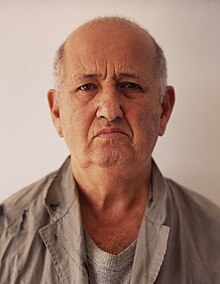Moshe Gershuni
| Moshe Gershuni | |
|---|---|

Moshe Gershuni, 2007
|
|
| Born |
11 September 1936 Tel Aviv, British Mandate Palestine |
| Died | 22 January 2017 (aged 80) Tel Aviv, Israel |
| Nationality | Israeli |
| Education | Avni Institute of Art and Design, Tel Aviv |
| Known for | Painting |
| Movement | Israeli art |
Moshe Gershuni (11 September 1936 – 22 January 2017) was an Israeli painter and sculptor. In his works, particularly in his paintings from the 1980s, he expressed a position different from the norm, commemorating The Holocaust in Israeli art. In addition, he created in his works a connection between bereavement and homoerotic sexuality, in the way he criticized society and Israeli Zionism-nationalism. He was awarded the Israel Prize for Painting for his work in 2003, but in the end it was revoked and he was deprived of receiving the prize.
Moshe Gershuni was born in 1936 to Yona and Zvi Kutner, who had migrated to British Mandate Palestine from Poland. Zvi, the head of the family, who was an agronomist and farmer, “hebraicized” the family name from Kutner to Gershuni, after his father. His mother Yona, née Senior, acted in community theater in Poland and made hats in Tel Aviv. The family lived in Tel Aviv on Hahashmal Street, and in 1939 moved to Mazeh Street. In 1938 Mira, Moshe's sister, was born, and in 1943, his brother Avshalom was born. Moshe was sent to the religious Bilu School and then continued his studies in a religious high school.
His father managed to save several family members from The Holocaust by arranging immigration certificates (certifikatim) to British Mandate Palestine, but some of his mother's relatives perished in the Holocaust. Gershuni described in a late interview the presence of the Holocaust in his childhood: “My mother was troubled all the rest of her life that she had not succeeded in bringing them here. And, like many others, I remember the years after the war […] I remember that I read everything I could on the subject, there were already personal accounts of it on the radio, in private conversations, from the relatives who arrived. […] it was in my consciousness, it was almost the center of my consciousness, in spite of the fact that my early years included the founding of the State and the war with the Arabs, but everything was a function of that experience.”
In 1952 the family moved from Tel Aviv to Herzliya, near to the family-owned orchards, in the Gan Rashal area. In 1954, Gershuni’s induction into the army was postponed by half a year because he was underweight, but the date of induction in 1955 was also postponed by the death of his father in an auto accident. Gershuni took over his father’s job in the orchards. After his father's death Gershuni began to move into the world of art. The painter Leon Fouturian and the sculptor Uri Shoshany, both residents of Herzliya, influenced him. From 1960 to 1964 he studied sculpture in night courses at Avni Institute of Art and Design, after days spent working in the orchards. His teachers were Dov Feigin and Moshe Sternschuss, members of the “New Horizons” group, which during these years was beginning to lose the central place it had held in the world of Israeli art.
...
Wikipedia
